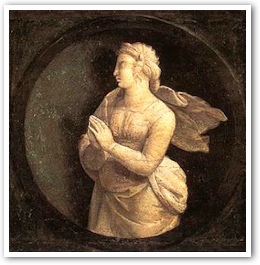The Origin of the Holy Spirit
- KENNETH BAKER, S.J.
In the Nicene Creed, after professing belief in the Holy Spirit, we go on to say that he proceeds from the Father and the Son.
 |
As we have seen, the Son proceeds from the Father alone who is the originless origin of both the Son and the Holy Spirit.
The idea of “procession” or “coming forth” in the inner divine life has its basis in a number of Scriptural texts. Jesus says of himself in John 8 (42), “For I proceeded and came forth from God”; and he says of the Spirit that he “proceeds from the Father” (Jn 15:26). In these texts Jesus is speaking not only of the external manifestations of the Spirit and his own Incarnation in time and space, but he is also referring to the internal, external origin of himself and the Holy Spirit.
By “procession” is understood the origin of one from another. When we speak of an internal, divine procession, we mean the origin of one divine Person from another through the communication of the numerically one divine essence. It is to be remembered that it is not the divine essence or substance that proceeds; rather, the Second Person (Son) proceeds from the originless Father and the Third Person (Holy Spirit) proceeds from the Father and the Son as from one principle. For, the Second Council of Lyons (1274) defined as dogma of faith that the Holy Spirit proceeds from the Father and the Son, not as from two principles, but as from one principle.
Both Father and Son constitute one principle of the Holy Spirit because the Son, by virtue of his eternal generation from the Father, possesses everything that the Father possesses except the fatherhood. In John 16 (15), Jesus says in testimony of this, “All that the Father has is mine.” This means that he must be the principle, along with the Father, of the Holy Spirit.
Let me remind you that we previously spoke about the procession of the Son from the Father. There we said that the Son was “generated” from the Father. Thus there are two processions in the inner divine life of God: the procession of the Son from the Father which we call “generation”, and the procession of the Holy Spirit from the Father and the Son as from one principle. Since the Holy Spirit is not “generated” by the Father and the Son, he is not to be called something like a second son of God. Jesus Christ is the “only-begotten Son of God”. So there is only one divine Son.
The Fathers of the Church invented a new word to designate the procession of the Holy Spirit. They called it “spiration” or “breathing forth”. The word, of course, is related to “spirit” or “breath”. The reason for this is that the Holy Spirit proceeds from the will or the mutual love of the Father and the Son. Hence he has a special relationship to love, which is an impulse or impelling of sorts, and which in human persons is manifested by heightened activity — often by an increase in heavy breathing. The connection between the Holy Spirit and love is brought out by St. Paul in Romans (5:5): “The charity of God is poured forth into our hearts by the Holy Spirit, who is given to us.”
The essential activities of any spiritual-personal being are knowing and willing. Scripture tells us clearly, and the tradition of the Church from the beginning bears witness to the belief, that there are three Persons in one God. Scripture indicates, and the Fathers and the magisterium of the Church teach, that the procession of the Son is related to God’s knowing and the procession of the Holy Spirit is related to God’s willing and loving. For this reason the Son is said to be the “wisdom” of God and the Holy Spirit is said to be the “love” or “gift” of God.
Thus the Holy Spirit proceeds from an act of willing in God — the mutual love between the Father and the Son, and so the Nicene Creed professes that he “proceeds from the Father and the Son”.
![]()
See the index of chapters from Fundamentals of Catholicism which have been reprinted to CERC here.
 This is Meaghen Gonzalez, Editor of CERC. I hope you appreciated this piece. We curate these articles especially for believers like you.
This is Meaghen Gonzalez, Editor of CERC. I hope you appreciated this piece. We curate these articles especially for believers like you.
Please show your appreciation by making a $3 donation. CERC is entirely reader supported.

Acknowledgement
Kenneth Baker, S.J. "The Origin of the Holy Spirit." In Fundamentals of Catholicism Vol. 1 Chapter 31 (San Francisco: Ignatius Press, 1995), 92-94.
This article reprinted with permission from Father Kenneth Baker, S.J.
The Author

 Father Kenneth Baker, S.J., assumed editorship of Homiletic & Pastoral Review in April 1971 and remained in this position for almost forty years. In 1983 he published a three-volume explanation of the faith called Fundamentals of Catholicism Vol. 1, Creed and Commandments; Vol. 2, God, Trinity, Creation, Christ, Mary; and Vol. 3, Grace, the Church, the Sacraments, Eschatology
Father Kenneth Baker, S.J., assumed editorship of Homiletic & Pastoral Review in April 1971 and remained in this position for almost forty years. In 1983 he published a three-volume explanation of the faith called Fundamentals of Catholicism Vol. 1, Creed and Commandments; Vol. 2, God, Trinity, Creation, Christ, Mary; and Vol. 3, Grace, the Church, the Sacraments, Eschatology




